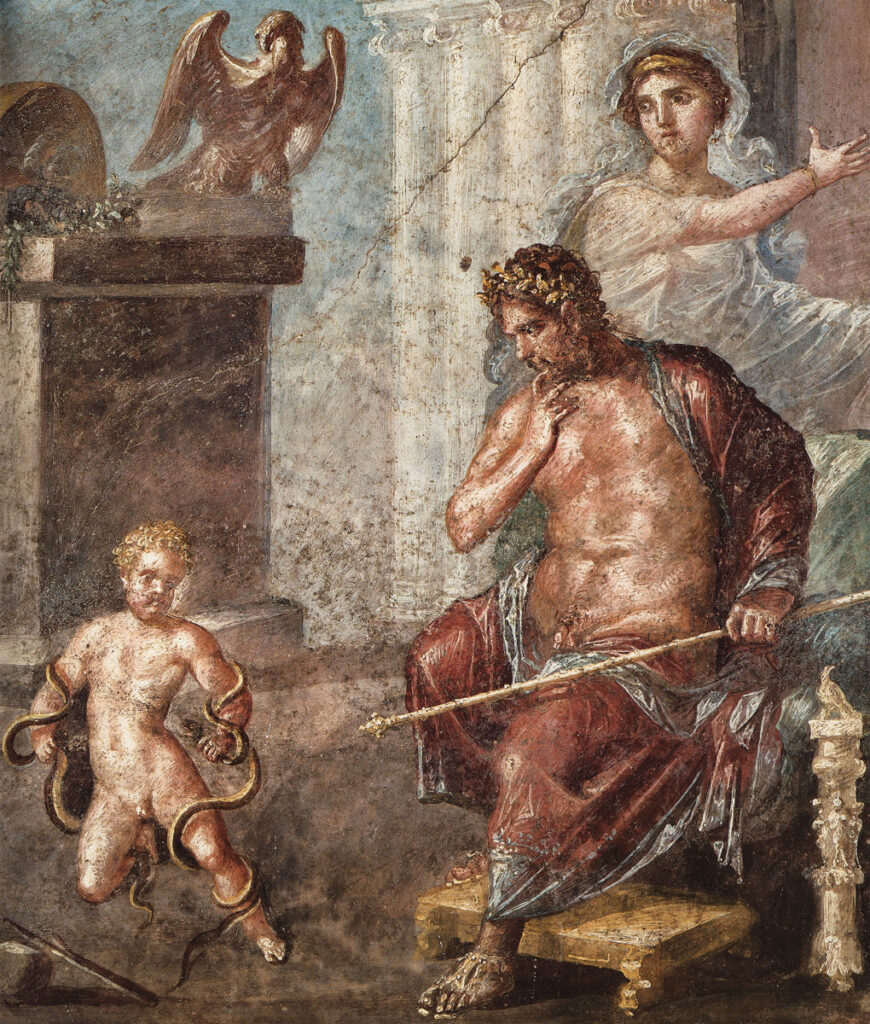
Watching the birth of Herakles, Hera plots how she’s going to kill this baby, while Zeus tries to remember the name of his son’s mother, and checks out the nurse.
Meeting 11: In which Homer continues to not understand the basics of childbearing, and Hera continues to be the stepmother from hell.
This episode of Mythology Pitch Meetings brought to you by CLAS-C 210 Ancient Medicine and Modern Terminology.
Have you ever wondered how your favorite Classical Myths came to be? This is absolutely not how that happened, but it could have happened, maybe, and that’s the point of mythology. Shout-out to Ryan George, whose Pitch Meeting video series inspired the Muses.
CALLIOPE, MUSE OF EPIC POETRY: So you have a Classical Myth to pitch to me?
HOMER, UNCONTESTED G.O.A.T OF ANCIENT POETRY: Do I! You asked for an epic story that will set up an entire spinoff limited series. And boy, this one’s going to be huge. It’s the story of a hero named Hercules who has to complete a series of impossible tasks to gain immortality.
CALLIOPE: Um, I hate to tell you, but that’s not how humans gain immortality. It’s never based on anything they do. It’s entirely based on whether some divinity picks them up as a booty call.
HOMER: Just wait until you here this one. It starts out with a princess named Alcmene, who marries a king named Amphitryon. But she refuses to give him, um, “special hugs” until he avenges the deaths of her brothers. So off he goes to do that, and while he’s gone, Zeus decides to pay Alcmene a visit.
CALLIOPE: Of course he does. What sort of animal does he disguise himself as this time?

Weirdest. Family. Portrait. Ever.
HOMER: Actually, I thought I’d shake things up and do something different with this one.
CALLIOPE: He has an honest conversation with her and asks for her fully informed consent?
HOMER: Oh gods, no. He disguises himself as her victorious husband and claims his “reward” for avenging her brothers. But the next night, the real Amphitryon comes home and claims his “reward” for avenging her brothers. Alcmene obviously realizes something is up, in more ways than one, but she keeps her mouth shut and hopes this will all sort itself out.
CALLIOPE: Does it?
HOMER: Oh gods, no. In fact, she’s immediately in trouble with Hera, Zeus’ sister-wife-queen. See, Alcmene is pregnant, because one of the most important signs of superiority in Greek myth will be super sperm that hit the mark the very first time. And Hera is the goddess of childbirth, so now she has insider information on Alcmene’s whole situation,
CLIO, MUSE OF HISTORY (interrupting): If she has any information at all, that’s more than most ancient women got for their pregnancy.
HOMER: Oh, she doesn’t use it to help Alcmene. Quite the opposite. Hera decides to stick it to Zeus by tricking his child out of inheriting the kingdom. She gets Zeus to promise that the first royal child born on the night Alcmene goes into labor will be the high king.
CALLIOPE: That’s an awfully specific bet. And Hera always is trying to screw Zeus over, metaphorically at least. Tell me Zeus doesn’t fall for that.
HOMER: He absolutely does. I’ve decided that in Greek myth no one will be able to resist a suspiciously specific bet or demanded promise, especially where the person proposing the bet absolutely should not be trusted. It will be catastrophic catnip for everyone.
CLIO: And conveniently drive a surprising number of plot points.
HOMER: That has nothing to do with it. If you can tell me what I have in my pocket, I’ll demonstrate how the bet device is not a writer’s crutch but a really clever insight into human nature.
CLIO: You’re wearing a himation, and those don’t even have pockets. Nevertheless, I’ll take that bet.
HOMER: Anyway, when Alcmene does go into labor, Hera orders the goddess of childbirth, Ilithyia, to sit outside the room with her legs crossed! Then she makes the mother of Hercules’ relative, Eurystheus, go into preterm labor, so out he comes and he becomes high king instead!
CALLIOPE: I have so many questions. First of all, I thought you said Hera was the goddess of childbirth. Who’s sitting with their legs crossed? And why would anyone crossing their legs stop a baby being born? Also, big picture, did the goddess of childbirth just endanger two women’s labors so that she could successfully trick the god of wisdom and justice?
CLIO: I’ll take the first two. Hera is the goddess of all things relating to pregnancy. Ilithyia is the goddess of labor itself, really a personification. And crossing one’s legs was believed to be sympathetic magic, where performing an action could affect a similar action already in progress. I don’t know what’s up with the gods who continually undermine their own dominions.
CALLIOPE: Homer, you don’t seriously believe you can stop a woman’s labor by crossing your legs, do you?
HOMER: Of course I can’t. I’m not a goddess, or at least a human witch hired off the street corner.

Wikipedia caption: “Alcmene giving birth to Hercules surrounded by attendants: in the background a woman is hitting another over the head with a stone.” Proving once again, most people don’t understand how labor works.
CALLIOPE: But how does Hercules end up being born? There’s no way a mere human like Alcmene can overcome the sympathetic magic of a goddess.
HOMER: Actually, it will be super easy, barely an inconvenience. Alcmene’s midwife runs outside and announces that the baby has been delivered. And Ilithyia is so surprised, she jumps up, which uncrosses her legs, and the spell is broken!
CALLIOPE: Wait, another god is tricked here? Why in the world would the goddess of labor think she had lost control of a labor?
CLIO: To be fair, after an extended labor without any pain medication, you’d probably not be on top of your game, either.
HOMER: But then Alcmene gives birth to twins, and her secret is out!
CALLIOPE: Wait, what secret? I can’t keep track of who’s lying to whom in this story.
HOMER: That she was unfaithful to her husband Amphitryon.
CALLIOPE: But she hasn’t been unfaithful. You really struggle with the concept of defining fidelity in a relationship. And why would giving birth to twins reveal anything?
HOMER: (rolling eyes) Obviously, women can only be inseminated by one man at a time. So if they give birth to twins, it means they had sex with two different men in quick succession.
CALLIOPE: That is absolutely not how that works. A woman can’t get pregnant if she’s already pregnant. I’m pretty sure you’re thinking of puppies.
HOMER: Women can give birth to puppies?
CLIO: (interrupting) Actually, it’s very rare, but a woman can be impregnated when she’s already pregnant. Sometimes it’s a case of another egg being released and fertilized into the same uterus. In extremely rare cases a woman with two uteruses can carry a baby in each at the same time. Regardless, the number of fathers is irrelevant.
HOMER: So you’re saying a woman has to have two uteruses to give birth to twins?
CLIO: That is absolutely not what I said.
HOMER: Well, for the rest of the story to happen we’re going to have to go with my theory. When Alcmene gives birth to twins, Amphitryon flips out, and he orders her to be burned alive! But just as his men are about to set fire to her pyre, Zeus sends a thunder storm to douse the fire and save Alcmene. So Amphitryon realizes that Zeus is the other man in the situation, and he better just shut up and raise the god’s kid.
CALLIOPE: Let me get this straight. Amphitryon, not having any direct insight into the actions of the gods, assumes that having twins mean his wife is unfaithful, and rain also means she’s unfaithful, but he’s ok with it now?
CLIO: Once it’s invented, science is going to blow his mind.
HOMER: I wouldn’t say he’s ok with it. He’s still trying to figure out which son is actually his. But it’s hard to tell with infants, because all they do is expel various liquids, and even heroes can’t be heroic with that.
CALLIOPE: Yeah, I guess it would be really difficult for him to solve that problem.
HOMER: Actually, that also turns out to be super easy, barely an inconvenience.. See, Hera sends two snakes down to kill Alcmene’s children. But when the snakes attack, the baby hero grabs the snakes and strangles them! And that’s how Amphitryon learns that the baby Hercules is the son of almighty Zeus!

And you thought Jerry Springer’s paternity tests were intense.
CALLIOPE: Wait a tick, doesn’t the name Hera-kles mean “the glory of Hera?”
HOMER: Exactly! Hera is going to be Hercules’ archenemy. She’s going to try to kill him over and over and over again, and he’ll always make it through.
CALLIOPE: How does that give her glory?
HOMER: No, no, I meant the “glory of Hera,” like she bestows glory. As in “the challenge of the Golden Fleece.”
CLIO: That’s super confusing. Scholars will be perplexed by this name thing for centuries, by the way.
HOMER: It’s not confusing. How could it mean “Hera’s glory?” Women can’t earn glory. They can’t do anything impressive.
CALLIOPE: Right, squeezing not one but two living beings out upside down through an opening normally the size of finger, all without the benefit of pain mitigation or germ theory—that’s not impressive at all. I’ll green light this nonsense story, but only because, as I said, I’m looking for something to jump start a miniseries. At least you’ve set up a classic hero-villain pairing, although admittedly the hero is a baby at this point. Also, for marketing purposes, you should probably start on a child-friendly version of this, in case we want to sell this to kids later.
HOMER: Why in the world would anyone think this story is appropriate for children?
Share on Instagram, or really wherever you want.
To explore the absolutely bananas world of ancient medicine, enroll in CLAS-C 210 Ancient Medicine and Modern Terminology, coming up next semester Spring 2024! Or for more specific facts about how ancient Greeks wildly misunderstood the female reproductive system, look for CLAS-B 311 Ancient Sex and Gender, also coming up Spring 2024 with no pre-reqs! Can’t get enough of Ancient Greece and Rome? Earn a Classics Minor in just 15 credits!



